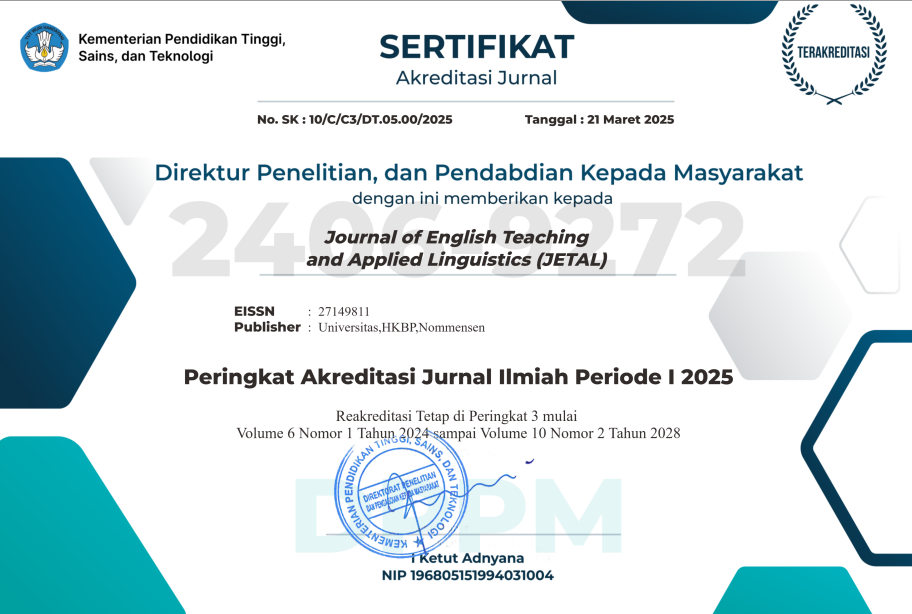An Exploration of EFL Students' Perceptions of AI-Integration in the Learning Process
Abstract
This study explores EFL students’ perceptions of artificial intelligence (AI) integration in language learning, utilizing Kahneman’s Dual Process Theory (2011) to examine intuitive (System 1) and reflective (System 2) cognitive responses. The study aims to understand how junior EFL learners engage with AI tools, and to explore the perceived benefits and challenges of AI-assisted learning. A qualitative research approach was employed, involving 14 students from a Junior-Teenager Conversation class in Medan, selected through convenience sampling. Data were collected using a two-part questionnaire: the first part consisted of multiple-choice items to assess instinctive, emotional reactions, while the second part included open-ended questions to elicit analytical and evaluative responses. Data were gathered during regular classroom sessions and analyzed thematically using Braun and Clarke’s (2006) five-phase framework. The findings revealed that 71.4% of students found AI tools “interesting,” while 7.1% felt “optimistic” and 21.4% “amazed.” Key benefits included AI’s user-friendly interface (42.9%) and well-explained responses (35.7%), while concerns included reduced learning effort (57.1%) and potential academic dishonesty (35.7%). The study highlights the dual impact of AI enhancing personalization and engagement, while presenting ethical and pedagogical challenges. It recommends balanced integration of AI in EFL learning and further research into its long-term effects.
References
Alammari, A. (2024). Evaluating generative AI integration in Saudi Arabian education: A mixed-methods study. PeerJ Computer Science, 10, Article e1879. https://doi.org/10.7717/peerj-cs.1879
Ali, E. H. Rd. M. (2019). Students’ attitudes towards the use of Artificial Intelligence SIRI in EFL learning at one public university. In International Seminar and Annual Meeting BKS-PTN Wilayah Barat. 1(1). 190-194.
Alshumaimeri, Y. A., &Alshememry, A. K. The extent of AI applications in EFL learning and teaching. IEEE Transactions on Learning Technologies. 17. 653-662. http://dx.doi.org/10.1109/TLT.2023.3322128
AlTwijri, L., & Alghizzi, T. M. (2024). Investigating the integration of artificial intelligence in English as foreign language classes for enhancing learners’ affective factors: A systematic review. Heliyon, 10(10), e31053. https://doi.org/10.1016/j.heliyon.2024.e31053
Al-Zahrani, A. (2024). Unveiling the shadows: beyond the hype of AI in education. Heliyon. 10(9). https://doi.org/10.1016/j.heliyon.2024.e30696
Chellappa, V., & Luximon, Y. (2024). Understanding the perception of design students towards ChatGPT. Computers and Education: Artificial Intelligence, 7(February), 100281. https://doi.org/10.1016/j.caeai.2024.10028
Chiu, T. K. F. (2024). Future research recommendations for transforming higher education with generative AI. Computers and Education: Artificial Intelligence, 6(November 2023), 100197. https://doi.org/10.1016/j.caeai.2023.100197
Crawford, J., Cowling, M., & Allen, K.-A. (2023). Leadership is needed for ethical ChatGPT: Character, assessment, and learning using artifcial intelligence (AI). Journal of University Teaching and Learning Practice, 20(3), 02
Darwin, Rusdin, D., Mukminatien, N., Suryati, N., Laksmi, E. D., & Marzuki. (2024). Critical thinking in the AI era: An exploration of EFL students’ perceptions, benefits, and limitations. Cogent Education, 11(1). https://doi.org/10.1080/2331186X.2023.2290342
Dai, K., Liu, Q. (2024). Leveraging artificial intelligence (AI) in English as a foreign language (EFL) classes: Challenges and opportunities in the spotlight. Computers in Human Behavior, 159. 10.1016/j.chb.2024.108354.
Daweli, T. W., & Mahyoub, R. A. M. (2024). Exploring EFL learners’ perspectives on using ai tools and their impacts in reading instruction: An exploratory study. Arab World English Journal (AWEJ) Special Issue on CALL,(10). 160-171. https://dx.doi.org/10.24093/awej/call10.11
Duhaylungsod, A. V., & Chavez, J. V. (2023). Chatgpt and other ai users: Innovative and creative utilitarian value and mindset shift. Journal of Namibian Studies: History Politics Culture, 33, 4367–4378. https://doi.org/10.59670/jns.v33i.2791
Espartinez, A. S. (2024). Exploring student and teacher perceptions of ChatGPT use in higher education: A Q-Methodology study. Computers and Education: Artificial Intelligence, 7(July), 100264. https://doi.org/10.1016/j.caeai.2024.100264
Fan, J., & Zhang, Q. (2024). From literacy to learning: The sequential mediation of attitudes and enjoyment in AI-assisted EFL education. Heliyon, 10(17), e37158. https://doi.org/10.1016/j.heliyon.2024.e37158
Farazouli, A., Cerratto-Pargman, T.Bolander-Laksov, K., & McGrath, C. (2024). Hello GPT! Goodbye home examination? An exploratory study of AI chatbots impact on university teachers’ assessment practices. Assessment and Evaluation in Higher Education, 49(3), 363–375.https://doi.org/10.1080/02602938.2023.2241676
Fauzi, F., Tuhuteru, L., Sampe, F., Ausat, A. M. A., & Hatta, H. R. (2023). Analysing the role of ChatGPT in improving student productivity in higher education. Journal on Education, 5(4), 14886–14891.
Genelza, G. G. (2022). A case study research on Justin Herald’s language development. Journal of Languages, Linguistics and Literary Studies, 2(3), 133-141.
Giday, D. G., & Perumal, E. (2024). Students’ perception of attending online learning sessions post-pandemic. Social Sciences and Humanities Open, 9(June 2023), 100755. https://doi.org/10.1016/j.ssaho.2023.100755
Golzar, J. (2022). Convenience Sampling. International Journal of Education and Language Studies, 1(2), 72–77. https://doi.org/10.4135/9781412972024.n551
Hirankerd, K., & Kittisunthonphisarn, N. (2020). E-learning management system based on reality technology with AI. International Journal of Information and Education Technology, 10(4), 259–264. https://doi.org/https://doi.org/10.18178/ijiet.2020.10.4.1373
Kahneman, D. (2011). Thinking, Fast and Slow. Penguin Books.
Kamalov, F., Calonge, D. S., & Gurrib, I. (2023). New era of artificial intelligence in education: towards a sustainable multifaceted revolution. Sustainability. 15(16). 1-27. https://doi.org/10.3390/su151612451
Kannengiesser, U., & Gero, J. S. (2019). Design thinking, fast and slow: A framework for Kahneman’s dual-system theory in design. Design Science, 5, 1–21. https://doi.org/10.1017/dsj.2019.9
Kim, H. S., Kim, N. Y., & Cha, Y. (2021). Is it beneficial to use AI chatbots to improve learners’ speaking performance? Journal of Asia TEFL, 18(1), 161–178. https://doi.org/10.18823/asiatefl.2021.18.1.10.161
Labadze, L., Grigolia, M., & Machaidze, L. (2023). Role of AI chatbots in education: systematic literature review. International Journal of Educational Technology in Higher Education. 20(56). 1-17. https://doi.org/10.1186/s41239-023-00426-1.
Lo, C. K. (2023). What is the impact of ChatGPT on education? A rapid review of the literature. Education Sciences, 13(4), 410
Luo, R., Wang, J., & Wang, Y. (2023). Undergraduate students’ perceptions of using videoconferencing for EFL learning: Evidence from Tencent Meeting application. Heliyon, 9(12), e22993. https://doi.org/10.1016/j.heliyon.2023.e22993
Malik, A. R., Pratiwi, Y., Andajani, K., Numertayasa, I. W., Suharti, S., Darwis, A., Marzuki. (2023). Exploring artificial intelligence in academic essay: higher education student's perspective. International Journal of Educational Research Open. 5. 1-11. https://doi.org/10.1016/j.ijedro.2023.100296
Mizumoto, A., Yasuda, S., & Tamura, Y. (2024). Identifying ChatGPT-generated texts in EFL students’ writing: Through comparative analysis of linguistic fingerprints. Applied Corpus Linguistics, 4(3), 100106. https://doi.org/10.1016/j.acorp.2024.100106
Muthmainnah, Ibna Seraj, P. M., & Oteir, I. (2022). Playing with AI to Investigate Human-Computer Interaction Technology and Improving Critical Thinking Skills to Pursue 21stCentury Age. Education Research International, 2022. https://doi.org/10.1155/2022/6468995
Nguyen, A., Ngo, H. N., Hong, Y., Dang, B., & Nguyen, B. P. T. (2023). Ethical principles for artificial intelligence in education. Education and Information Technologies, 28(4), 4221–4241. https://doi.org/10.1007/s10639-022-11316-w
Oravec, J.A. (2023). Artificial intelligence implications for academic cheating: expanding the dimensions of responisble human-AI collaboration with ChatGPT and Bard. Journal of Interactive Learning Research, 34(2). 213-237.
Pasenta, P., & Chakim, N. (2024). EFL students’perceptions and practices of using artificial intelligence (ai) in writing thesis proposal. Yavana Bhasha: Journal of English Language Education, 7(2), 90-99.
Qadir, J. (2023). Engineering education in the era of ChatGPT: Promise and pitfalls of generative AI for education. IEEE Global Engineering Education Conference (EDUCON), 2023, 1–9
Shidiq, M. (2023). The use of artifcial intelligence-based chat-gpt and its challenges for the world of education; from the viewpoint of the development of creative writing skills. Proceeding of International Conference on Education, Society and Humanity, 1(1), 353–357.
Shoufan, A. (2023). Exploring Students’ Perceptions of ChatGPT: Thematic Analysis and Follow-Up Survey. IEEE Access, 11(March), 38805–38818. https://doi.org/10.1109/ACCESS.2023.3268224
Stöhr, C., Ou, A. W., & Malmström, H. (2024). Perceptions and usage of AI chatbots among students in higher education across genders, academic levels and fields of study. Computers and Education: Artificial Intelligence, 7(April), 0–11. https://doi.org/10.1016/j.caeai.2024.100259
Teng, M. F. (2024). “ChatGPT is the companion, not enemies”: EFL learners’ perceptions and experiences in using ChatGPT for feedback in writing. Computers and Education: Artificial Intelligence, 7(July), 100270. https://doi.org/10.1016/j.caeai.2024.100270
Vidaurre, S. M. E., Rodriguez, N. C. V., Quelopana, R. L. G., Valdivia, A. N. M., Rossi, E. A. L., & Nolasco-Mamani, M. A. (2024). Perceptions of artificial intelligence and its impact on academic integrity among university students in peru and chile: an approach to sustainable education. Sustainability. 16(20). 1-22. https://doi.org/10.3390/su16209005
Waluyo, B., & Kusumastuti, S. (2024). Generative AI in student English learning in Thai higher education: More engagement, better outcomes? Social Sciences and Humanities Open, 10(September), 101146. https://doi.org/10.1016/j.ssaho.2024.101146
Westera, W., Prada, R., Mascarenhas, S., Santos, P. A., Dias, J., Guimarães, M., Georgiadis, K., Nyamsuren, E., Bahreini, K., Yumak, Z., Christyowidiasmoro, C., Dascalu, M., Gutu-Robu, G., & Ruseti, S. (2020). Artificial intelligence moving serious gaming: Presenting reusable game AI components. Education and Information Technologies, 25(1), 351–380. https://doi.org/10.1007/s10639-019-09968-2
Wulyani, A. N., Widiati, U., Muniroh, S., Rachmadhany, C. D., Nurlaila, Hanifiyah, L., Sharif, T. I. S. T. (2024). Patterns of utilinzing AI-assisted tools among EFL students: Need surveys for assesment model development. LLT Journal: A Journal on Language and Language Teaching. 27. 157-173. https://doi.org/10.24071/llt.v27i1.7966.
Zhai, C., & Wibowo, S. (2023). A systematic review on artificial intelligence dialogue systems for enhancing English as foreign language students’ interactional competence in the university. Computers and Education: Artificial Intelligence, 4, 100134. https://doi.org/10.1016/j.caeai.2023.100134
Zhai, C., Wibowo, S., & Li, L. D. (2024). The effects of over-reliance on AI dialogue systems on students’ cognitive abilities: a systematic review. Smart Learning Environment, 11(28). 1-37. https://doi.org/10.1186/s40561-024-00316-7
Zadorozhnyy, A., & Lai, W. Y. W. (2023). ChatGPT and L2 written communication: A game-changer or just another tool? Language, 9(1),

This work is licensed under a Creative Commons Attribution-ShareAlike 4.0 International License.
Authors retain copyright and grant the journal right of first publication with the work simultaneously licensed under a Creative Commons Attribution-ShareAlike 4.0 International License (CC BY-SA 4.0) that allows others to share the work with an acknowledgment of the work's authorship and initial publication in this journal.
Authors are able to enter into separate, additional contractual arrangements for the non-exclusive distribution of the journal's published version of the work (e.g., post it to an institutional repository or publish it in a book), with an acknowledgment of its initial publication in this journal.
Authors are permitted and encouraged to post their work online (e.g., in institutional repositories or on their website) prior to and during the submission process, as it can lead to productive exchanges, as well as earlier and greater citation of published work (See The Effect of Open Access).






